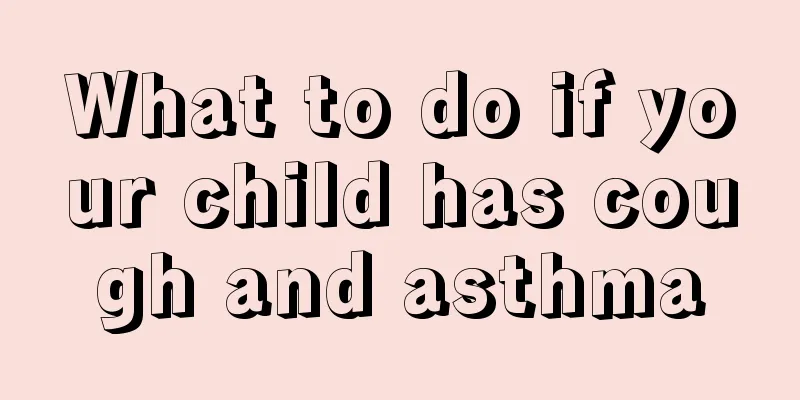What are the symptoms and clinical manifestations of tracheitis in children?

|
The weather nowadays is really changeable, especially during the transition from winter to spring, children are very likely to get sick, the most common of which is bronchitis. If a child has symptoms such as coughing, runny nose, fever, and wheezing, you should be alert to bronchitis. (1) Clinical manifestations The onset can be acute or slow. Most of them first have symptoms of upper respiratory tract infection such as runny nose, nasal congestion, fever, sore throat, etc., and may suddenly have more and deeper dry coughs, followed by gradual bronchial secretions and increasing sputum volume. Infants and young children will not cough up sputum, and most of them will swallow it through the pharynx. More or less dry rales or coarse moist rales can be heard on both sides of the chest. The general symptoms may be mild or severe. Mild cases have no obvious signs of illness, while severe cases have moderate fever, occasionally high fever, which usually subsides within 2-3 days. Feeling tired, affecting sleep and appetite, and even causing gastrointestinal symptoms such as vomiting, diarrhea, and abdominal pain. Older children may occasionally complain of headaches and chest pains. The cough usually lasts for 7-10 days, sometimes lingers for 2-3 weeks, and may even relapse after being relieved. It is especially prone to recurrence in children with malnutrition, congenital heart disease, rickets, etc. If not properly treated, it may cause pneumonia. There is a special type of bronchitis called asthmatic bronchitis. Its characteristics are that the age of onset is mostly young, and it often occurs after upper respiratory tract infection with asthma and expiratory dyspnea, and has a certain recurrence rate. (2) Physical and chemical examination The white blood cell count is normal or slightly low, and the level is elevated in patients with secondary bacterial infection. X-ray examination showed thickening of the lung markings. (3) Treatment Symptomatic treatment: For severe cough, expectorants and cough suppressants or appropriate amounts of sedatives can be used. For asthmatic bronchitis, aminophylline can be taken orally. If the fever persists above 38.5℃, physical or drug cooling can be used. Control infection: Co-trimoxazole 30-60 mg/kg/day, orally in 2 divided doses, acetylspiramycin tablets or midecamycin tablets, 30-40 mg/kg/day, orally in 3-4 divided doses. (4) Nursing Pay attention to rest and gradually increase activities after the symptoms are under control. The diet should be light, and during the fever period, it is advisable to give liquid and soft food and drink plenty of water. The room temperature should be constant, avoiding being too high, too low or too dry. Keep the indoor air circulating and avoid irritation from gas, dust, smoke, etc. The baby should be changed into a lying position frequently, or held up and patted for a while to make it easier for respiratory secretions to be discharged. (5) Prevention Strengthen physical exercise and enhance disease resistance. Pay attention to temperature changes, add or remove clothes appropriately, and avoid overheating or cold. Avoid cross infection. For those who have recurrent episodes, medication can be used for prevention, such as taking 6-9 grams of Astragalus daily for 2-3 months. Vaccines can also be used to prevent recurrence. It is particularly easy to get sick when the weather changes. Colds and fevers are particularly common, and some people even develop bronchitis. Through the above introduction, I believe everyone has a better understanding of acute bronchitis. In addition to receiving regular treatments, you should also pay attention to home care in daily life, keep the indoor ventilation, develop good hygiene habits, avoid bacterial infections, and make good dietary adjustments. You must avoid foods that you cannot eat. |
<<: Can children with cold and fever drink milk?
>>: How to prevent ADHD in children?
Recommend
How to deal with yellow discharge from baby's ears?
The ears are the organ that allows us to hear, so...
What are the dangers of chewing gum for children?
Children should try not to eat chewing gum. For a...
What to do if your child coughs and has phlegm but can't cough it out
When children are young, their immunity is low, s...
Why do new teeth not grow for a year when they are replaced?
Generally speaking, children will have all their ...
How many days does it take to recover from phimosis surgery in children?
It is a common condition for children to have phi...
Three ways to make it easier to put your baby to sleep
Getting your baby to sleep is a very stressful ta...
What should I do if my child has a fever recently?
Parents must not panic when their children have a...
The child has a lot of spots on his face
Children's skin is the best and looks very cu...
What should I do if my child has blue veins on his head?
Children are the most important members of every ...
The harm of binding the hands and feet of newborns
In the past, when ideas and technology were relat...
Can children eat shrimp?
Children are in the stage of growing up and need ...
What are the skin diseases in children?
Babies have delicate skin and poor resistance, so...
What can children eat to help them grow taller?
As we all know, some children of the same age hav...
What to do if your two and a half year old baby is nearsighted
In recent years, with the increasing number of el...
What is the reason for blood streaks in the stool of a 1-year-old baby?
When a child is sick, the most worrying thing for...









